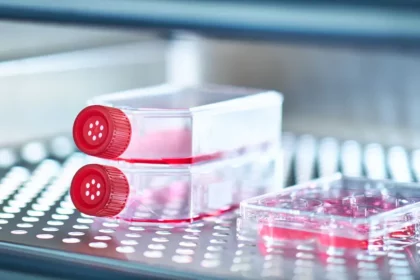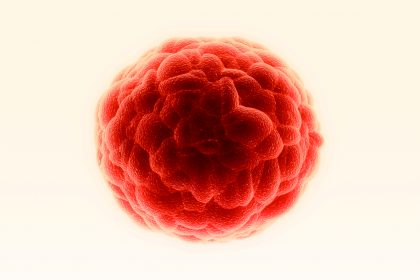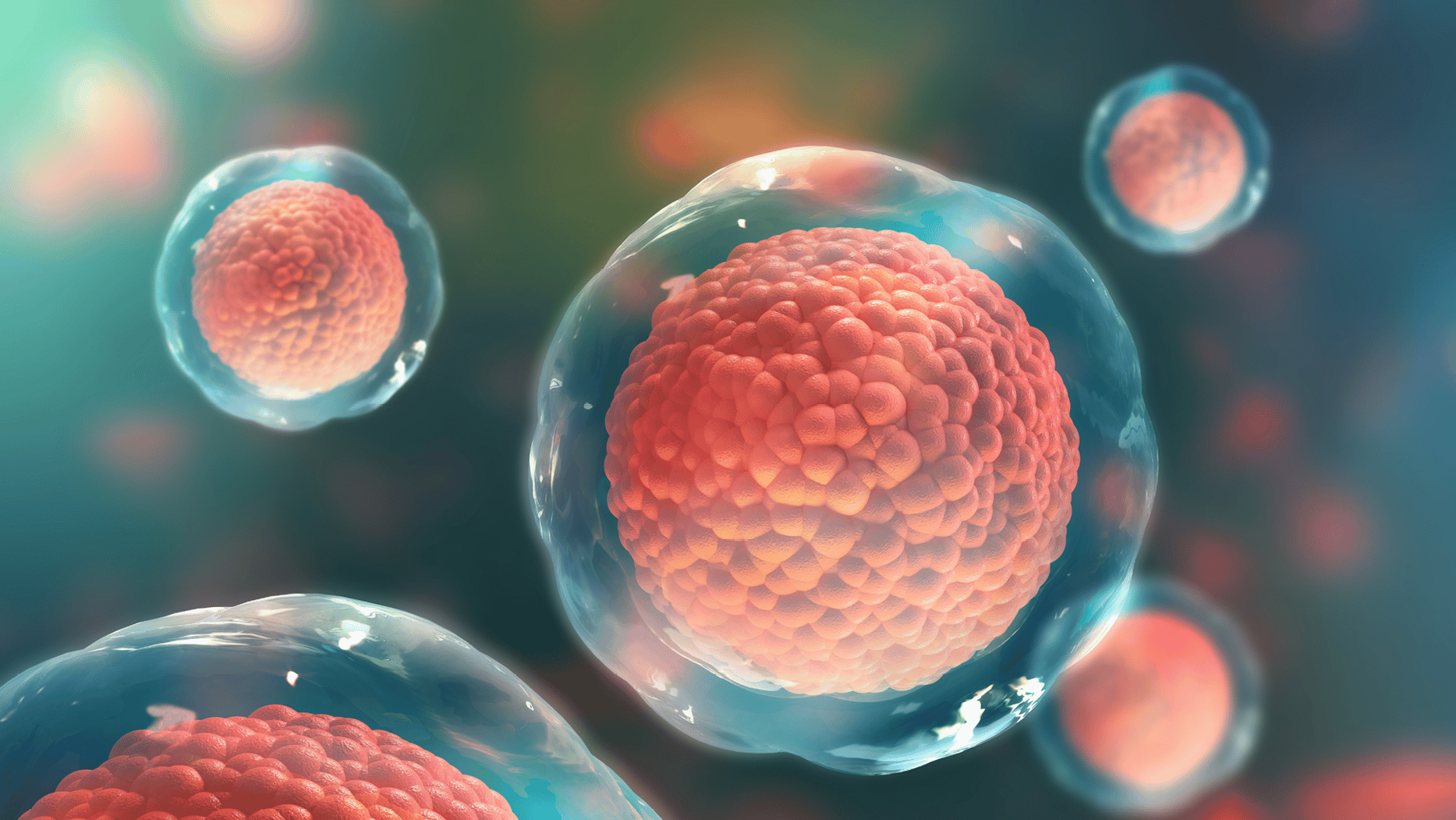
The continuous innovation of cancer therapies is at the forefront of biomedical research. Targeting the immune system and harnessing biological mechanisms to strengthen its response to cancer holds powerful potential for therapeutics. Mesenchymal stem cells, abbreviated MSCs, are a specialized type of cell that are multipotent and can differentiate into different types of tissue as well as play a role in the regeneration and repair of tissues1.
Furthermore, mesenchymal stem cells have immunomodulatory functions, gaining a lot of attention as a promising approach for the advancement of cell and gene therapies. For example, MSCs can regulate the inflammatory and immune response in the body by stimulating specialized immune cells depending on what is required for tissue repair1.
However, mesenchymal stem cells are dual-edged as a biological instrument. While it may benefit the body during tissue regeneration, the cells can also contribute to the creation of tumors by supporting tumor microenvironments, contributing to the growth of tumors, and suppressing antitumor immune responses1. Due to their pleiotropic nature, understanding the mechanisms and relationships of mesenchymal stem cells in cancer is key to developing effective therapeutics for the disease.
This article will provide an overview of the role of mesenchymal stem cells in oncology by highlighting how they communicate, their role in the tumor microenvironment and cancer stem cells, and how they can be harnessed for cell and gene therapy to treat cancer. This piece will also briefly emphasize how innovative products and procedures can help amplify the clinical usability of mesenchymal stem cells in biomedicine.
How do mesenchymal stem cells communicate?
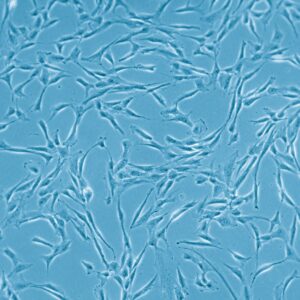
In order to fulfill its regulatory role, mesenchymal stem cells must have the ability to communicate on an intercellular level. Mesenchymal stem cells can either directly modify the microenvironment through signaling with proteins like cytokines, chemokines, and growth factors. Mesenchymal stem cells can also influence the functions of the microenvironment through the release of extracellular vesicles (EVs)2.
The scientific and medical community has shifted focus toward extracellular vesicles (EVs) as crucial mediators in MSC cell to cell communication in recent years. EVs contain an array of molecules such as RNA and proteins that can influence the biological functions of cells2. Molecules in extracellular vesicles secreted by mesenchymal stem cells can be suppressive or supportive of tumors, i.e., certain microRNAs possess tumor-suppressive functions while some tissue inhibitors of metalloproteases like (TIMP)-1 and -2 promote tumors2. Therefore, the mechanism of communication by mesenchymal stem cells presents an encouraging target for cancer therapeutics and could open new avenues of disease treatments not yet explored.
Mesenchymal stem cells, cancer stem cells (CSC), and the tumor microenvironment (TME)
Mesenchymal stem cells-derived extracellular vesicles are a significant player in the tumor microenvironment because they can be harnessed by tumor cells and cancer stem cells to communicate and induce changes affecting the function of cells involved1. For example, when MSCs arrive at a tumor, they can affect the motility of cancer cells by supporting the epithelial-mesenchymal transition process where cells gain migratory and invasive characteristics often noted in metastatic cancers, which is a more severe and dangerous character of the disease3. Mesenchymal stem cells can also manipulate the tumor microenvironment by promoting angiogenesis, the process of generating blood vessels that tumors need to survive and grow, ultimately enhancing tumor progression3.
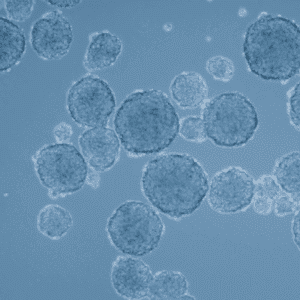
The formation and modification of the tumor microenvironment come from cancer stem cells which can activate mesenchymal stem cells to support cancer stem cell proliferation and tumor growth4. Cancer stem cells – key players in tumor development, growth, resistance, and metastasis – can secrete tumor supporting factors that alter the gene expression of mesenchymal stem cells, shifting their functions to be more conducive to cancer promotion4. Due to this relationship, the communication between mesenchymal stem cells and cancer stem cells provides a suitable treatment focus for cancer researchers and clinicians.
Scientists who investigate the interaction between mesenchymal stem cells and cancer stem cells can use 3D cell cultures, also called tumorspheres, to create a more representative model of a tumor microenvironment that could yield very valuable insights into cancer biology5.
A deeper understanding of the biological processes underpinning cancer coupled with cutting-edge platforms can broaden the impact and improve upon existing cell and gene therapy options as well as contribute to the formulation of new ones.
Cell and gene therapy options in oncology using mesenchymal stem cells
Through the immunomodulatory functions of mesenchymal stem cells, cancer researchers can refine and enhance cell and gene therapy options to create personalized medical solutions. By harnessing the ability of mesenchymal stem cells to modulate the tumor microenvironment, cancer drug and therapy creators can influence the cells’ functioning to favor cancer suppression. For example, due to the nature of mesenchymal stem cells to migrate to tumors, they pose an avenue to deliver anti-cancer drugs to tumor sites6. Furthermore, investigators can manipulate mesenchymal stem cells through antibody therapy and affect the process of angiogenesis that tumors hinge upon to survive6.
The immunological properties of mesenchymal stem cells also present a valuable tool for scientists to wield against cancer, forming the basis for immunotherapies. Mesenchymal stem cells have the potential to be engineered to induce immune system cells such as macrophages, dendritic cells, T cells, B cells, and natural killer (NK) cells that can regulate and suppress cancerous cells7. As mesenchymal stem cells can activate T cells, mesenchymal stem cells can be used in CAR-T cell therapy development – a potentially more effective cellular treatment for cancer. Mesenchymal stem cells’ ability to specifically identify and migrate to tumor sites gives the potential to enhance CAR-immune cells’ activity designed to eliminate cancer via engineered T cells8.
In addition to cell therapies, mesenchymal stem cells can be utilized as an efficient solution in gene therapies against cancer. Similar to how MSCs can be used as a vehicle to deliver drugs to the site of tumors, they can also deliver genes. Genetic material intended to alter the characteristics or functioning of live tumor cells can be transferred into the mesenchymal stem cells, which will then recognize and migrate to tumor sites and deliver this therapy9. MSCs can also be genetically modified to secrete specific proteins targeted to the control of cancer9.
The relationship between mesenchymal stem cells and other cells in the tumor microenvironment, namely cancer stem cells, can also be exploited to treat cancer. Inhibiting the intercellular communication between the two types of cells can potentially decrease cancer stem cell populations, lower tumor resistance to drugs, and lessen the ability of tumors to metastasize and/or grow4. To do this, scientists can utilize exosomes – a type of extracellular vesicle that is used by mesenchymal stem cells and cancer stem cells to communicate with each other – to destroy cancer stem cells4.
Finally, the potential for mesenchymal stem cells to treat cancer does not stop at prevention. Mesenchymal stem cells can be utilized in regenerative medicine, harnessing their ability to build tissue to reconstruct bones damaged by tumors and tumor removal surgeries10.
Innovating the Use of Mesenchymal Stem Cells in Clinical Applications
This article has reviewed the science surrounding mesenchymal stem cells and cancer as well as established the clinical relevance of these stem cells. In order to move forward and develop impactful cell and gene therapies, products and processes centered around the manufacturing and proper use of the cells are needed.
Currently, mesenchymal stem cells are demanded at increasingly higher rates, posing a supply challenge to laboratories11. However, scientific and medical experts can continue to innovate therapeutics by exploring various media, methods, and processes to design more standardized protocols that best exploit the advantages of mesenchymal stem cells in disease research..
If you are a researcher or clinical scientist working in industry or academia with mesenchymal stem cells and cancer stem cells in cancer studies and/or cell and gene therapy development, please reach out to our professionals to learn more about how to harness the role of mesenchymal and cancer stem cells in oncology.
References
- Galland, S., & Stamenkovic, I. (2019). Mesenchymal stromal cells in cancer: a review of their immunomodulatory functions and dual effects on tumor progression. The Journal of Pathology, 250(5), 555–572.
- Casson, J., et al. (2018). Mesenchymal stem cell-derived extracellular vesicles may promote breast cancer cell dormancy. Journal of Tissue Engineering, 9, 204173141881009.
- AHN, S. Y. (2020). The Role of MSCs in the Tumor Microenvironment and Tumor Progression. Anticancer Research, 40(6), 3039–3047.
- Jing, Y., et al. (2022). The Role of Mesenchymal stem cells in the Induction of Cancer-Stem Cell Phenotype. Frontiers in Oncology, 12.
- A Home for Cancer Stem Cells: 3D Tumorspheres. (2018, April 17). PromoCell.
- Aravindhan, S., et al. (2021). Mesenchymal stem cells and cancer therapy: insights into targeting the tumour vasculature. Cancer Cell International, 21(1).
- Almeida-Porada, G., et al. (2020). Therapeutic Mesenchymal Stromal Cells for Immunotherapy and for Gene and Drug Delivery. Molecular Therapy – Methods & Clinical Development, 16, 204–224.
- Chan, L. Y., et al. (2022). CAR-T Cells/-NK Cells in Cancer Immunotherapy and the Potential of MSC to Enhance Its Efficacy: A Review. Biomedicines, 10(4), 804.
- Attia, N., et al. (2021). Mesenchymal stem cells as a Gene Delivery Tool: Promise, Problems, and Prospects. Pharmaceutics, 13(6), 843.
- Using mesenchymal stem cells in regenerative medicine. (2019, November 25). PromoCell.
- Mesenchymal stem cells: why optimizing manufacturing processes is key for a successful application. (2020, July 31). PromoCell.

